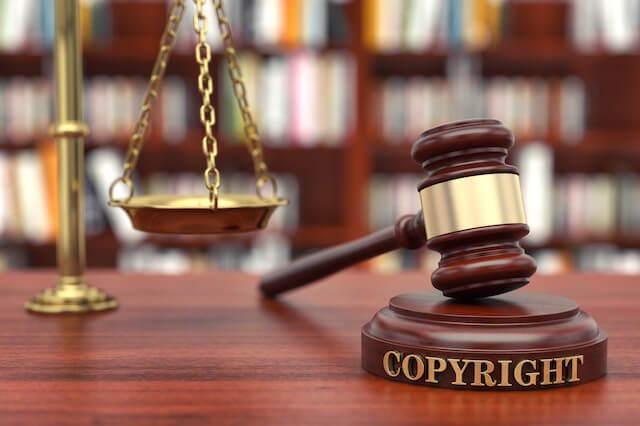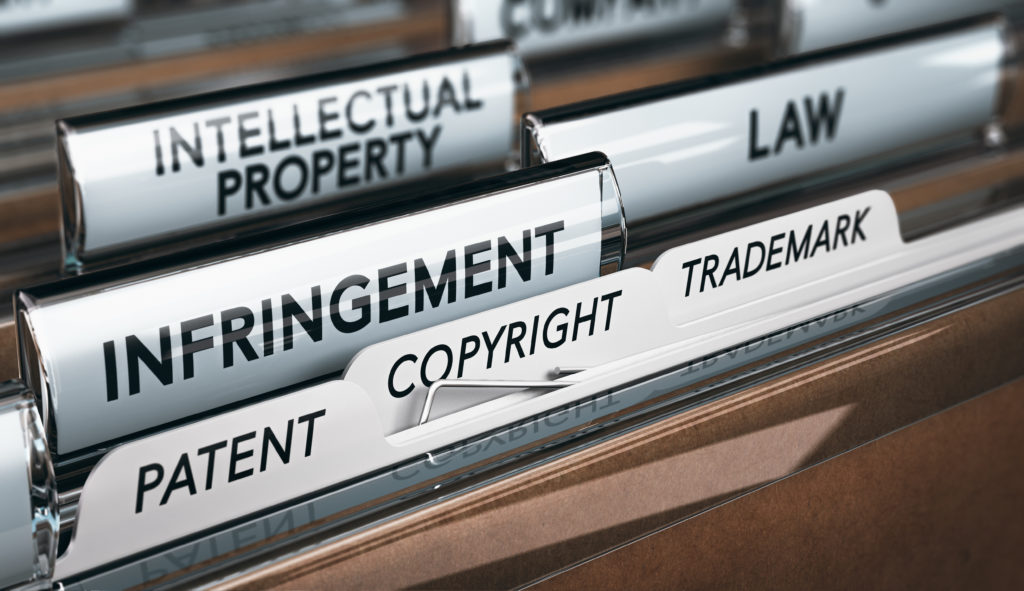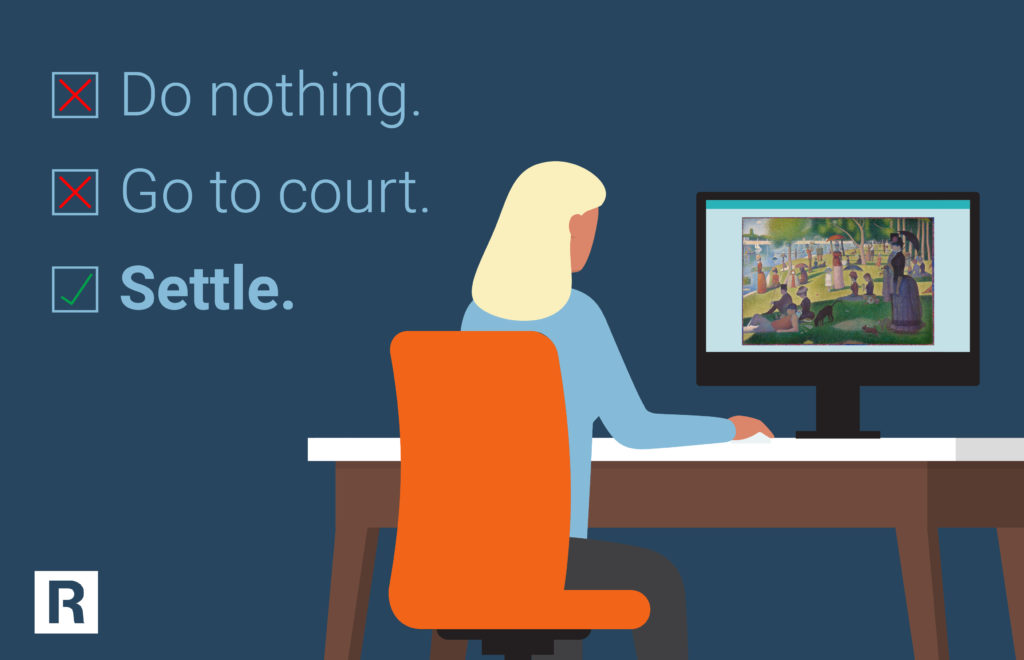
Being accused of copyright infringement is an unwelcome surprise. The internet is littered with websites illicitly providing free access to copyrighted material, yet you rarely hear about people actually being caught and punished. While your sense of disbelief might tempt you to simply look the other way, burying your head in the sand will only make things much worse. Being on the losing end of a copyright infringement lawsuit can be very costly. When confronted with a copyright infringement lawsuit, your best option by far is to hire an attorney and settle your case as soon as possible.
What Is a Copyright Infringement Lawsuit?

When someone creates a “tangible work,” such as a video or audio recording, federal law automatically protects the creator’s rights to their work through a “copyright.” This gives the creator the exclusive right to reproduce, publish, or sell that work. To make sure this exclusive right is respected, federal law also provides a way for copyright owners to sue “infringers,” people who violate these rights by “using” (reproducing, distributing, etc.) a copyrighted work without its owner’s permission. Through a copyright infringement lawsuit, an owner can recover compensation from the infringer if the owner can prove they had exclusive rights to copyrighted material that were violated by the infringer.
Why Are You Being Sued?
In all likelihood, the copyright owner suing you or threatening to sue you has evidence that you violated their exclusive rights to their copyrighted work. And knowing that under federal law, they can sue you for a rather large sum of money, their objective is to get you to pay them, whether by an out-of-court deal or by a court order. The most common scenario we see is large multimedia companies, specifically in the adult film industry, targeting illegal downloaders of their content as a sort of copyright claim business model. But a copyright infringement lawsuit can come from any owner of a valid copyright.
What Happens if You Just Ignore It?
This is an all too common reaction. People ignore copyright infringement lawsuits for various reasons. Some people simply don’t understand what they are being accused of and how serious it is. Others understand the gravity of the situation but don’t believe the notices they receive are legitimate. And there’s a third group who thinks since they believe themselves innocent, there is nothing to worry about. Whatever their reasons, all the “avoiders” share in common the belief that by doing nothing, the case will go away. And this couldn’t be more false, the reason being “default judgments.”
If you ignore your copyright infringement case, you will lose “by default,” and the court will order you to pay a significant sum of money.
What does it mean to lose “by default?” In civil cases, when the person being sued fails to file a response on time, they can lose the lawsuit automatically if the person filing the lawsuit has shown the court they have a valid legal claim. The concept is very similar to a sports team forfeiting a game. If one team shows up ready to play but the other team doesn’t, we say the missing team forfeits and automatically loses the game. So, if the person suing you makes a valid copyright infringement claim and you ignore the case completely, you will effectively forfeit and be held liable for a lot of money.
For context, under federal law, a copyright infringer can be liable for up to $30,000 per work infringed upon. This amount can rise to $150,000 per work if the copyright owner can show the infringer was aware that they were infringing a copyrighted work when they did so. In addition, you can be held liable for the copyright owner’s attorney’s fees. All of this adds up to an incredibly significant amount of monetary damages.
Does This Mean I Should Fight It at Trial?
It might seem logical that if by doing nothing, you will lose automatically, your best option is to do something and hire an attorney to fight it out in court. But actually, this option is just as bad, if not worse, than doing nothing.
Let’s first consider why fighting your copyright infringement lawsuit at trial is just as bad as doing nothing. The problem is that in both cases, you will likely lose and be held liable. We’ve already established that when you do nothing, you lose your case by default. Well, when you fight your case in court, you will almost certainly lose for two main reasons. One, in most cases, the copyright owner already has in hand clear evidence of your guilt. And two, it is very difficult to convince a court that you didn’t infringe a copyright in the face of this evidence.
Good examples are cases involving illegal downloads. When a copyright owner walks into court with evidence tracing an illegal download back to someone’s IP address, which is in turn traced to that someone’s password protected WiFi, it’s difficult for this person to prove they didn’t in fact do the illegal download. Whatever they might say, without the almost-impossible-to-get evidence of, say, someone hacking their WiFi and doing the illegal download, the most logical conclusion is that they are responsible.
Fighting your case in court can also be much worse than doing nothing. Remember that if you lose, you can also be liable for the copyright owner’s attorney’s fees. Going to trial is going to cost the owner far more in attorney’s fees than would a default judgment. Plus, you will have your own costs associated with going to trial. So, you will probably end up paying more by taking your case to trial than by ignoring it completely.
For a Guide on Copyright Infringement Notices read this article.
Why You Should Settle… And as Soon as Possible
By this point, I imagine you are on the verge of frustration. If you’ll lose by doing nothing but lose even worse by fighting your case in court, isn’t your best solution to just do nothing anyway? No. Fortunately, there is a third option: settling.

What Is a Settlement?
A “settlement” or “settling your case” is when you agree to pay a sum of money to the person suing you in exchange for them promising not to take you to court. In a copyright infringement case, you would agree to pay the copyright owner, and they would agree to never sue you over the specific instances of copyright infringement that they are accusing you of. Cases are “settled” all the time. People don’t want to go to court if they can help it because it is incredibly expensive and can take a very long time.
Why Settling Is Your Best Option
As you’re still paying them money, you might wonder how settling is any better than doing nothing or going to trial. Settling is a better option because if your settlement is handled properly by a competent attorney, you will end up paying far less money than what you would have owed if you lost by default or lost at trial. This is because your attorney will negotiate a lower rate than what would be applied in court.
What do we mean by a “lower rate?” In copyright infringement cases, the “damages,” meaning what the infringer is ordered to pay, are usually calculated by multiplying an “infringement penalty rate” by the number of copyrighted works that were infringed. For example, if you committed 10 illegal downloads, and the infringement penalty rate was $30,000 per download, the total damages would be $300,000 ($30,000 x 10 downloads). In our experience, we can generally negotiate the “infringement penalty rate” down to a significantly lesser amount through a settlement than what it would be if your case ended up in court. And with a lower rate, you end up paying far less damages in total.
Why Time Is of the Essence
Don’t forget, you also have to account for the other party’s attorney’s fees. You should aim to settle your case as soon as possible, as the price of your settlement will go up over time. The main reason is that a settlement will almost always factor in the copyright owner’s attorney’s fees, and the longer it takes to resolve things, the higher their attorney’s fees will be.
Case Study: Default Judgment
In this real-life case, John R. was ordered to pay thousands of dollars when he ignored his copyright infringement case and lost by default in court. Pay close attention to all the moments where John had the opportunity to take action but instead did nothing, and consider how damaging this was to his case.
How Did John Get Here?
We begin with some speculation about what happened early on in John’s case, before he was taken to court. We will do this to underscore an important point about copyright infringement cases: the time to do something begins long before your case ends up in court. We are able to guess quite confidently what happened early in this case because we know how these types of copyright infringement cases work. The copyright owner who sued John, Malibu Media, is an adult film company well known for making a business out of suing people who illegally download their adult content. There are at least a few companies operating these sorts of copyright lawsuit schemes, and they all work in more or less the same way:
- Malibu Media identified John’s IP address as having hosted a number of illegal downloads of its adult content.
- The company got a court to issue a subpoena (a type of court order) telling the internet service provider connected to the offending IP address to reveal its account holder’s identity (John); at this point they would have only known the IP address, not that it was John behind it.
- The internet service provider notified the relevant account holder, John, telling him Malibu Media was asking about his account. John probably ignored this notice completely.
- The internet service provider gave up John’s identity to Malibu Media.
- Malibu Media contacted John threatening to sue and asking him to enter a settlement, meaning an agreement to pay them a sum of money so they won’t take the case to court. Again, John probably ignored this.
- Malibu Media, seeing that John wasn’t willing to settle, took the case to court.
What Happened at Court?
Predictably, John failed to respond to Malibu Media’s lawsuit. The court responded by setting a hearing asking John to show why he should not lose the case by default. Though he received official notice of this hearing, again, John did nothing and failed to show up. In turn, the court entered a default judgment against him and asked Malibu Media to propose how much John should have to pay in damages. After considering Malibu Media’s proposal and consulting the law, the court issued a ruling.
How Did the Court Rule?
The court accepted Malibu Media’s proposed damages, noting they were consistent with what the law allowed. They also explained exactly why John lost the case. The basic idea behind the court’s ruling against John is quite simple: Malibu Media had a valid legal claim, and John did not respond, so Malibu Media won. But, if you look closely at how the court explains its reasoning, you get a sense of how damaging it is to ignore your copyright infringement lawsuit completely. Consider the highlighted portions of this excerpt from the court’s decision.
Let’s break down the court’s main points in plain English:
- When the person being sued doesn’t respond to the lawsuit, they are implying that they agree with the other party’s version of events, so the court should accept that version of events also.
- To prove copyright infringement, the copyright owner has to show
- They own a valid copyright, and
- The other person copied the copyrighted work without permission.
- Malibu Media proved they owned a valid copyright and showed John downloaded and distributed their copyrighted work without its permission.
- Therefore, John was liable.
Notice how easy it is for the copyright owner to win when the other party ignores the lawsuit entirely. By doing nothing, John set off the court’s entire chain of reasoning, which cleared an easy path for Malibu Media’s victory. If by doing nothing, you accept the copyright owner’s version of events, the court just needs to check whether the copyright owner’s claims are legally valid before making you, the alleged infringer, responsible for paying thousands of dollars.
Making a valid copyright infringement claim is relatively simple. You just have to show you own a valid copyright and the other person copied the work without your permission. The copyright owner brings the lawsuit precisely because they are confident they can satisfy these requirements. So, in this case, Malibu Media only brought the lawsuit in the first place because they were confident that they had a valid copyright and evidence that John violated it.
This is why when you do nothing in your case, you are all but guaranteed to lose and be held liable. Once the case gets to court, the court takes your silence as agreement. With your agreement, winning becomes easy for the copyright owner. The court just needs to confirm what the owner already knows to be true, that they have a valid copyright and evidence that you violated it.
What Was the Outcome?
The court ordered that John was to pay Malibu Media $18,000 in damages and $400 in costs. The $18,000 in damages amounted to a penalty of $1,500 for each of John’s illegal downloads. The $400 in costs actually did not factor in attorney’s fees, but only because Malibu Media decided not to ask for them in this case, a rare occurrence. The $400 instead covered what it cost Malibu Media to file this lawsuit to begin with. Below is an actual copy of the court’s default judgment against John. The “R&R” referenced is just the judge’s recommendation as to the appropriate damages.
Where Did John Go Wrong?
John’s number one mistake, from the very first day he was confronted with the copyright infringement claim, was doing nothing. When you simply ignore a copyright infringement case, you will most likely lose by default, with the result being that you are liable for a hefty sum of money.
What Could John Have Done Differently?
It’s important to grasp the full reality of John’s situation. Regardless of his side of the story, in light of Malibu Media’s evidence, he was most likely going to be found guilty of copyright infringement. The company had proof of illegal downloads of its copyrighted content tracking back to John’s IP address. But just because John didn’t have a real shot at fighting this case doesn’t mean that he was stuck with just one outcome. To secure a more favorable outcome in his case, John could have settled.
Remember, a settlement is when you agree to pay the other party a sum of money in exchange for them not taking the case to court. John was ordered to pay $1,500 per illegal download, at a total of $18,000 for his 12 downloads. If John had brought his case to us at some point before he lost by default, we would have been able to negotiate this rate down to a much lower number, resulting in a settlement with Malibu Media that would cost John a fraction of what he ultimately paid under the default judgment.
Frequently Asked Questions
You should look to settle your copyright infringement case as soon as possible. Do not wait to be taken to court. The earlier you settle, the less it will cost you. This is mainly because you are most likely going to be on the hook for the copyright owner’s attorney’s fees, and the sooner the case settles, the less work their attorneys have to do, meaning the less they will charge.
We can’t say for sure that copyright owners will always be willing to settle. But in our experience, the vast majority of the time, they want to settle. And this makes total sense. Lawsuits are expensive and time consuming. Copyright owners are usually willing to give up a little money for the convenience of resolving the case quickly and outside of court.
Even if you are truly innocent, you still have the challenge of proving your innocence in court. This is difficult because copyright owners usually don’t bring lawsuits if they aren’t sure they can win. The other side probably has evidence leading them to believe you will be liable in the eyes of the court. This means you will have to somehow combat their evidence and prove your innocence, which is complicated in the copyright infringement context. Chances are, even if you are innocent, settling will be your safest option.
When we handle settlements, we typically include a term in the settlement agreement that says the copyright owner cannot later sue our client for the instances of infringement that are the subject of the agreement. So, no, they cannot sue you later on for the specific instances of infringement included in the settlement, as long as a provision saying so is part of the agreement.
Who Should I Contact?
If you’ve been confronted with a copyright infringement action, there is no time to waste. The savvy attorneys at Rosenblum Law stand ready to negotiate a just settlement on your behalf and help you put your copyright infringement troubles behind you once and for all. E-mail our law firm or call 888-815-3649 for a free consultation.

